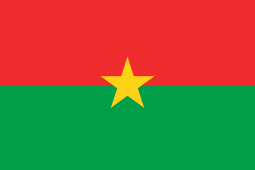French Upper Volta
| Upper Volta Haute-Volta | |||||
| Constituent of French West Africa | |||||
| |||||
|
| |||||
| Anthem La Marseillaise • Hymne National Voltaïque (instrumental only) | |||||
.png) Light green: French West Africa. Dark gray: Other French possessions. Darkest gray: French Republic. | |||||
| Capital | Ouagadougou | ||||
| Lieutenant Governor | |||||
| • | 1919–1927 | Édouard Hesling | |||
| • | 1928–1932 | Albéric Fournier | |||
| Premiera | |||||
| • | 1957–1958 | Daniel Ouezzin Coulibaly | |||
| • | 1958 | Maurice Yaméogo | |||
| Historical era | Interwar · Cold War | ||||
| • | Established | 1 March 1919 | |||
| • | Abolished | 5 September 1932 | |||
| • | Reestablished | 4 September 1947 | |||
| • | Autonomy | December 11, 1958 | |||
| • | Independence | 5 August 1960 | |||
| a. President of the Government Council. | |||||
Part of a series on the |
||||||||||||||
|---|---|---|---|---|---|---|---|---|---|---|---|---|---|---|
| History of Burkina Faso | ||||||||||||||
 | ||||||||||||||
|
||||||||||||||
|
||||||||||||||
|
| ||||||||||||||
Upper Volta (French: Haute-Volta) was a colony of French West Africa established on March 1, 1919, from territories that had been part of the colonies of Upper Senegal and Niger and the Côte d'Ivoire. The colony was dissolved on September 5, 1932, with parts being administered by the Côte d'Ivoire, French Sudan and the Colony of Niger.
After World War II, on September 4, 1947, the colony was revived as a part of the French Union, with its previous boundaries. On December 11, 1958, it was reconstituted as the self-governing Republic of Upper Volta within the French Community, and two years later on August 5, 1960, it attained full independence. On August 4, 1984, the name was changed to Burkina Faso.
The name Upper Volta indicates that the country contains the upper part of the Volta River. The river is divided into three parts, called the Black Volta, White Volta and Red Volta.
History
Until the end of the 19th century, the history of Upper Volta was dominated by the empire-building Mossi/Mossi Kingdoms, who are believed to have come up to their present location from Northern Ghana. For centuries, the Mossi peasant was both farmer and soldier, and the Mossi people were able to defend their religious beliefs and social structure against forcible attempts to convert them to Islam by Muslims from the northwest.
When the French arrived and claimed the area in 1896, Mossi resistance ended with the capture of their capital at Ouagadougou. In 1919, certain provinces from Côte d'Ivoire were united into a separate colony called the Upper Volta in the French West Africa federation. In 1932, the new colony was dismembered in a move to economize; it was reconstituted in 1937 as an administrative division called the Upper Coast. After World War II, the Mossi renewed their pressure for separate territorial status and on September 4, 1947, Upper Volta became a French West African territory again in its own right.
A revision in the organization of French Overseas Territories began with the passage of the Basic Law (Loi Cadre) of July 23, 1956. This act was followed by reorganizational measures approved by the French parliament early in 1957 that ensured a large degree of self-government for individual territories. Upper Volta became an autonomous republic in the French community on December 11, 1958.
Upper Volta achieved independence on August 5, 1960. The first president, Maurice Yaméogo, was the leader of the Voltaic Democratic Union (UDV). The 1960 constitution provided for election by universal suffrage of a president and a national assembly for five year terms. Soon after coming to power, Yaméogo banned all political parties other than the UDV.
Colonial governors
Lieutenant Governors (1919–1932)
- Édouard Hesling (November 9, 1919, to August 7, 1927)
- Robert Arnaud (August 7, 1927, to January 13, 1928), acting
- Albéric Fournier (January 13, 1928, to December 22, 1932)
- Gabriel Descemet (December 22, 1932, to December 31, 1932)
Governors (1947–1958)
- Gaston Mourgues (September 6, 1947, to April 29, 1948), acting
- Albert Mouragues (April 29, 1948, to February 23, 1953)
- Salvador Jean Étcheber (February 23, 1953, to November 3, 1956)
- Yvon Bourges (November 3, 1956, to July 15, 1958)
- Max Berthet (July 15, 1958, to December 11, 1958), acting
High Commissioners (1958–1960)
- Max Berthet (December 11, 1958 to February 1959)
- Paul Masson (February 1959 to August 5, 1960)
People born in French Upper Volta
See also
- Upper Volta territorial assembly election, 1957
- List of French possessions and colonies
- French colonial Empire
- French West Africa
- Heads of state of Burkina Faso
- Heads of government of Burkina Faso


